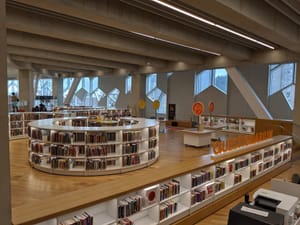OCUL (Ontario Council of University Libraries) has released a nice white paper which discusses issues in providing an end-user access environment for its shared resources, and more interestingly, how that environment engages with the behaviors and expectations of its academic users.
This document (pdf) was created to highlight opportunities and drive discussion for the OCUL consortium in both the short term through the launch of a new Scholars Portal server in 2008, and in the long term by incorporating more ‘social’ means of sharing and organizing information within OCUL’s Scholars Portal and the larger academic community that it serves. [Scholr 2.0]
There is a pdf version and a commentpress version with the benefit of reader comments.
As one might expect from a discussion white paper, there is a focus on questions and potential directions. Recommendations are given in several areas:
Enhance and improve the user interface
• Enrich Scholars Portal content by bringing in metadata from sources outside the journal repository
• Explore the implementation of controlled vocabulary, thesauri and authority control
• Add user tagging functionality
Connect the citation network to user workflow
• Provide table of contents (TOC) RSS feeds with links that facilitate authentication. If it is possible, allow users to generate their own RSS feeds.
• Provide users of scholarly resources with social bookmarking services
• Consider services that support the whole of the user’s research process and the development of online space for OCUL research communities.
• Seek means for Scholars Portal to be integrated into Learning Management Systems used by OCUL
Embrace standards and technologies that will allow present and future network discovery systems to make use of what we offer
• Provide both permalinks as well as COinS OpenURLs in the Scholars Portal server and to encourage OCUL libraries to adopt their own versions of LibX or promote other COinS readers
• Investigate how to take advantage of the attribute-based information that Shibboleth can provide
• Consider what semantic metadata could be provided through Scholars Portal
It usefully brings together a range of material. Worth a read.



